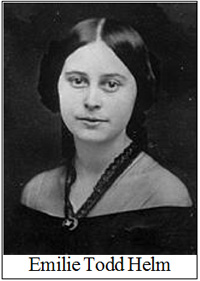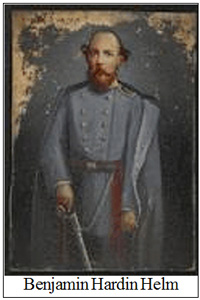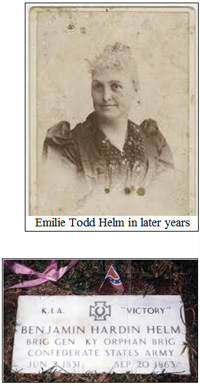 Volume
26, No. 10 – October 2013 Volume
26, No. 10 – October 2013
Volume 26, No. 10
Editor: Stephen L. Seftenberg
Website:
www.CivilWarRoundTablePalmBeach.org
President's Message
On Wednesday, November 6, 2013 at 11 AM, in the World Performing Arts
Center of Lynn University, an old friend of the Round Table, Robert
Watson, will discuss the many faces of Lincoln and the 150th anniversary
of the Emancipation Proclamation and the Gettysburg Address. This is a
free event.
October 9, 2013 Program
The speaker for this meeting will be Richard Adams. His subject will
be: West Point Class of 1861. This is the subject of his
book: The Parting. This book is a research-based story
about a true “band of brothers,” the West Point Class of 1861 (numbering
fifty, and a microcosm of the nation) on the eve of the Civil War and
experiencing their last year at the Academy. As the country unravels and
another is formed, best friends are forced to make choices that will pit
them against each other in war. With few exceptions, the story
characters are real and their deeds part of recorded history.
September 11, 2013 Program
Janell Bloodworth: "Emilie Todd Helm, Abraham
Lincoln’s Confederate Sister-in-Law"
Janell quoted liberally from Maggie MacLean’s Civil War Women Blog:
Emilie Todd Helm, Mary Todd Lincoln’s half-sister, was invited to the
White House in 1863, after the death of her husband, Confederate General
Benjamin Hardin Helm, in the Battle of Chickamauga.
 Emilie
was born November 11, 1836, to Robert Smith Todd and Elizabeth Humphreys
Todd of Lexington, Kentucky. She was born into a wealthy family with
exceptional advantages in both education and culture, which was afforded
to few ladies of her time. Emilie was 18 years younger than Mary. Robert
Todd was a prominent Lexington banker and patriarch of a growing brood.
He had seven children with his first wife, Eliza Ann Parker, on of whom
was Mary Todd Lincoln. Emilie was part of his "second family," the eight
children whom he fathered with Elizabeth. Most of the children from
Robert Todd’s second marriage sided with the Confederacy. In 1846, when
Emilie was ten, Mary arrived in Lexington with her husband, Abraham
Lincoln, an Illinois lawyer and rising member of the Whig party. Lincoln
has just been elected to Congress and they were on their way to
Washington, DC. Little Emilie was scared of Lincoln at first, a towering
figure in a long coat and black fur cap. As the adults chatted, Emilie
hid behind her mother’s skirts. Lincoln saw her, smiled and swept her up
into his arms, "So this is little sister!" From that day on, he called
her Little Sister. Emilie was considered the prettiest Todd
sister. She was petite, with raven-black hair and appealingly large
eyes. Emilie’s beauty, poise and charm made her the ideal Southern
belle. Emilie
was born November 11, 1836, to Robert Smith Todd and Elizabeth Humphreys
Todd of Lexington, Kentucky. She was born into a wealthy family with
exceptional advantages in both education and culture, which was afforded
to few ladies of her time. Emilie was 18 years younger than Mary. Robert
Todd was a prominent Lexington banker and patriarch of a growing brood.
He had seven children with his first wife, Eliza Ann Parker, on of whom
was Mary Todd Lincoln. Emilie was part of his "second family," the eight
children whom he fathered with Elizabeth. Most of the children from
Robert Todd’s second marriage sided with the Confederacy. In 1846, when
Emilie was ten, Mary arrived in Lexington with her husband, Abraham
Lincoln, an Illinois lawyer and rising member of the Whig party. Lincoln
has just been elected to Congress and they were on their way to
Washington, DC. Little Emilie was scared of Lincoln at first, a towering
figure in a long coat and black fur cap. As the adults chatted, Emilie
hid behind her mother’s skirts. Lincoln saw her, smiled and swept her up
into his arms, "So this is little sister!" From that day on, he called
her Little Sister. Emilie was considered the prettiest Todd
sister. She was petite, with raven-black hair and appealingly large
eyes. Emilie’s beauty, poise and charm made her the ideal Southern
belle.
Benjamin Hardin Helm was born June 2, 1831, in Elizabethtown,
Kentucky, the son of Lucinda Barbour Hardin and John Lane Helm, two-term Governor of Kentucky.
Benjamin was the first of 12 children. He attended the Kentucky Military
Institute and the U. S. Military Academy at West Point, New York,
graduating ninth in a class of 42 cadets in 1851. Hardin was appointed
Brevet Second Lieutenant in the 2nd U. S. Dragoons, but resigned his
commission the following year due to illness, after serving at a cavalry
school at Carlisle, Pennsylvania, and at Fort Lincoln, Texas. Helm then
studied law, first at the University of Louisville, where he graduated
in 1853 and later at Harvard. He practiced law in Elizabethtown, was
elected to the Kentucky House of Representatives in 1855, and became
States’ Attorney for the Third District of Kentucky. In 1860, he became
an Assistant Inspector General in the Kentucky State Guard.
Barbour Hardin and John Lane Helm, two-term Governor of Kentucky.
Benjamin was the first of 12 children. He attended the Kentucky Military
Institute and the U. S. Military Academy at West Point, New York,
graduating ninth in a class of 42 cadets in 1851. Hardin was appointed
Brevet Second Lieutenant in the 2nd U. S. Dragoons, but resigned his
commission the following year due to illness, after serving at a cavalry
school at Carlisle, Pennsylvania, and at Fort Lincoln, Texas. Helm then
studied law, first at the University of Louisville, where he graduated
in 1853 and later at Harvard. He practiced law in Elizabethtown, was
elected to the Kentucky House of Representatives in 1855, and became
States’ Attorney for the Third District of Kentucky. In 1860, he became
an Assistant Inspector General in the Kentucky State Guard.
Emilie married Benjamin in 1856. They had three children: Katherine
(1857-1937), who never married, became a well-known artist who painted
many portraits of the family and of notable personalities. She painted
six portraits of Mary Todd Lincoln, one of which now hangs in the White
House. She also wrote, The True Story of Mary, Wife of Abraham.
Elodie (1859-1953), married Waller Lewis but had no children. Benjamin
Hardin Helm, Jr. (1862-1946) never married. When the Helms visited the
Lincolns in the late 1850s, Lincoln took a liking to the younger man,
whom he called "Ben," despite their deep political differences. When the
Southern states seceded, Kentucky tried to stay remained neutral: Even
though it was a slave state and Southern in culture, it also had strong
Unionist sentiment, thanks to the nationalist traditions of famous
Kentuckians like Henry Clay. Some joined the South and some stayed with
the Union.
President Lincoln offered Helm an officer’s commission in the Union
army, but Helm declined. Instead he returned to Kentucky and helped
recruit the 1st Kentucky Cavalry Regiment, CSA. Helm was commissioned a
colonel on October 19, 1861. Under Gen. Simon Bolivar Buckner, he
occupied Bowling Green, Kentucky. Promoted to Brigadier General March
14, 1862, and was posted to Vicksburg, under Maj. Gen. John C.
Breckinridge, who led an expedition to Baton Rouge. Helm missed the
battle because of injuries from a fall off his horse. Four of Emilie’s
and Mary’s brothers fought for the Confederacy: David Todd, George
Rogers Clark Todd (a skilled surgeon and the only son of Robert Todd to
side with the South), Samuel Todd (killed at Shiloh April 1862) and
Alexander Todd (served as an aide to Helm; killed by friendly fire
August 1862).
Emilie followed her husband as the war progressed. In Chattanooga,
she organized better care for wounded soldiers. In early 1863, Helm was
put in command of the First Kentucky Brigade, which was nicknamed the
"Orphan Brigade," probably because the soldiers could not return to
their union-held homes during the war. On September 20, 1863, Helm was
mortally wounded leading a futile charge against strong Union
entrenchments in the Battle of Chickamauga. Helm asked the doctor if
there was any hope and was told there was none. As the sounds of battle
faded, he roused himself to ask the outcome. On being told that the army
had triumphed, he uttered, in a pained whisper, "Victory." Helm’s
passing was felt not only throughout Kentucky and the South, but sadness
also settled over the White House. Lincoln was deeply moved and told a
member of his cabinet that he felt like David in the Bible when he
learned his son, Absalom, had been killed. Abraham and Mary went into
private mourning, knowing "that a single tear shed for a dead enemy
would bring torrents of scorn and bitter abuse on both of them."
Emilie accepted an offer to visit the Lincolns in late 1863. She
passed through the Union lines in December 1863, accompanied by her
daughter, Katherine, despite Emilie’s refusal to attest to her loyalty
to the Union while temporarily detained in Fort Monroe, Virginia. Emilie
noted in her diary,
"Mr. Lincoln and my sister met me with the warmest affection, we
were all too grief-stricken at first for speech. I have lost my
husband, they have lost their fine little son, Willie. Mary and I
have lost three brothers in the Confederate service. We could only
embrace each other in silence and tears. Our tears gathered silently
and fell unheeded as with choking voices we tried to talk of
immaterial things."
There were lighter moments as well. Emilie’s daughter, Katherine, and
the Lincolns’ son, Tad, argued over whether the President was Abraham
Lincoln or Jefferson Davis. The Lincolns had a special fondness for
Emilie. While in Washington, however, she kept a very low profile.
Nevertheless, she was labeled "the Rebel in the White House," and
her stay caused a furor in the Northern press. When Gen. Daniel Sickles
baited Emilie by saying, "We have whipped the rebels at Chattanooga and
I hear the scoundrels ran like scared rabbits," Emilie responded, "It
was the example you set for them at Bull Run and Manassas." When Sickles
protested Emilie’s presence in the White House, Lincoln responded,
"General Sickles, my wife and I are in the habit of choosing our own
guests. We do not need from friends either advice or assistance in the
matter." Emilie soon left. Using the word, Confederate, which he
rarely wrote or spoke, Lincoln wrote the following pass (omitting
mention that Emilie had not taken an oath of loyalty to the Union):
"To whom it may concern: It is my wish that Mrs. Emilie T. Helm
(widow of the late General B. H. Helm, who fell in the Confederate
service), now returning to Kentucky, may have protection of person
and property, except as to slaves, of which I say nothing." A.
Lincoln.
Emilie found Lexington under Federal martial law and very hostile to
those who would not take an oath of loyalty to the Union. Shortly
thereafter, Emilie wrote to Lincoln, asking him to send clothing to
Confederate prisoners at Camp Douglas, outside Chicago. She concluded
the letter, "I hope am not intruding too much upon your kindness and
will try not to overstep the limits that I should keep." Later, when
Emilie sought permission to travel into the Confederacy to sell some
cotton, Lincoln declined. He had already gone out on a limb by giving
her an amnesty paper without her taking a loyalty oath. In August 1864,
he wrote the following order to the Union military commander in
Kentucky:
"Last December, Mrs. Emily T. Helm, half-sister to Mrs. Lincoln,
and widow of the rebel General Ben Hardin Helm, stopped here on her
way from Georgia to Kentucky, and I gave her a paper, as I remember,
to protect her against the mere fact of her being General Helm’s
widow. I hear a rumor today that you recently sought to arrest here,
but was prevented by her presenting the paper from me. I do not
intend to protect her against the consequences of disloyal words or
acts. It is hereby revoked, pro tanto. Deal with her for
current conduct just as you would with any other."
A. Lincoln
That did not stop Emilie from again requesting a pass to sell her
cotton in November 1864:
I have been a quiet citizen and request only the right which
humanity and justice always gives to widows and orphans. I also
would remind you that your minie bullets have made us what we are."
After this insult, the Lincolns never communicated with Emilie or saw
her again.
Emilie never remarried and wore mourning clothes for the rest of her
life. After the war, she and her children moved first to Elizabethtown, Kentucky, then to Madison,
Indiana and finally, in 1912 to a house in Lexington, Kentucky,
purchased by her son, where she gave piano lessons. She was active in
the local chapter of the United Daughters of the Confederacy and took
part in many military reunions. She was named, "Mother of the Orphan
Brigade," by the Regiment’s former soldiers.
children moved first to Elizabethtown, Kentucky, then to Madison,
Indiana and finally, in 1912 to a house in Lexington, Kentucky,
purchased by her son, where she gave piano lessons. She was active in
the local chapter of the United Daughters of the Confederacy and took
part in many military reunions. She was named, "Mother of the Orphan
Brigade," by the Regiment’s former soldiers.
She became close to her nephew, Robert Todd Lincoln, who, in 1881,
helped her obtain appointment as Postmistress of Elizabethtown,
Kentucky. She served in that position until 1895. As a kindness to her
nephew, she and her daughters, Katherine and Elodie, unveiled a statute
of President Lincoln in the town square of Hodgenville, Kentucky,
Abraham Lincoln’s birthplace. Emilie died February 20, 1930, at the age
of 93, and was buried in the Todd plot in Lexington.
On September 17, 1884, Helm’s remains were exhumed from his
battleground grave in Georgia, escorted by soldiers from both the Orphan
Brigade and the First Kentucky Cavalry and reburied in the family
cemetery in Elizabethtown, Kentucky, alongside his father’s grave. His
grave stone is pictured at above, with "VICTORY," marking his final
words.
Last changed: 10/03/13
Home
About News
Newsletters
Calendar
Memories
Links Join
|

